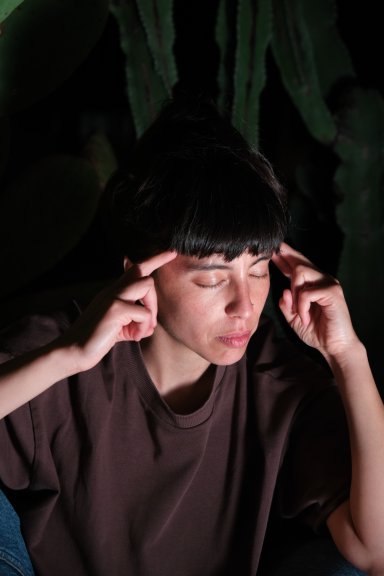21 > 25.10.24
Théâtre du Fil de l’eau
Emma Bigé studies, writes, translates and improvises between the fields of dance studies, queer studies and environmental inhumanities. A translator and textual artist, her books include Mouvementements. Écopolitiques de la danse (La Découverte, 2023), co-edited books on dance improvisation (Steve Paxton: Drafting Interior Techniques, 2019; The Apple Perspective. Histories, Politics and Practices of Contact Improvisation, 2021) and she has co-translated English-language transfeminist writers (including Jack Halberstam, Sara Ahmed, Alexis Pauline Gumbs, Karen Barad, Eva Hayward, Marquis Bey...). A curator, Emma Bigé has also created two exhibitions-in-dance, one on the history of Contact Improvisation (Musée de la danse, 2018) and the other on the work of North American improviser Steve Paxton (Culturgest, 2019), and is leading a long-term project, Zone d’Atterrissage Temporaire, dedicated to the installation of siesta zones in various European cities. Bigé holds an agrégation and a PhD philosophy, and she irregularly teaches epistemology at art schools and choreographic centers.
Born in Chile, Marcela Santander Corvalán trained in Milan and then at the CNDC in Angers. She also graduated in history and dance from the University of Paris 8. Since 2011 she has been working alongside choreographers Dominique Brun, Faustin Linyekula, Julie Nioche, Ana Rita Teodoro and Volmir Cordeiro. Her collaboration with choreographer Mickaël Phelippeau included the artistic direction of À domicile, in Guissény, Brittany. Since 2014 she has put her name to Époque with Volmir Cordeiro (2015), her first solo Disparue (2016), MASH with Annamaria Ajmone (2017), and Quietos (2019). In 2020 she co-authored the performed conference CONCHA – Histoires d’écoute on the theme of listening, with Hortense Belhôte. Marcela Santander Corvalán was associate artist at the Quartz theatre in Brest from 2014 to 2017 and is currently at La Manufacture, CDCN Nouvelle-Aquitaine Bordeaux La Rochelle.
Hélène Giannecchini is a writer, art theorist and teacher. She holds a PhD in literature, and specializes in the relationship between text and image. Her books include Une Image peut-être vraie (2014), Voir de ses propres yeux (2020) and Un désir démesuré d’amitié (2024), published by Éditions du Seuil in the “La Librairie du XXIe siècle” collection. Obsessed by images, she looks at them, exhibits them, collects them, writes about them and shares them. She is head of the Alix Cléo Roubaud collection, the artist to whom she dedicated her first book, and her work lies at the crossroads of literature, art history and theory. Her second book, Voir de ses propres yeux (Seeing with one’s own eyes), written at the Villa Médicis, is a novel that blends the story of mourning with the history of anatomy and dissection. Her current research focuses on queer archives from the second half of the 20th century. In particular, she is working on the work of photographer Donna Gottschalk. She also wrote the libretto for Cortèges, based on images from San Francisco’s Gay, Lesbian Bi and Trans Historical Society. This piece for symphony orchestra and electronics, composed by Sasha Blondeau, choreographed and performed by François Chaignaud, was performed at the Philharmonie de Paris in 2023. In 2021 and 2023 she spent time in writing residencies at the CN D in Pantin, pursuing her explorations of the links between dance, image and writing.
Archive Fever
“What’s your archive? A question that might make you tremble when searching for a past you’d like to hold on to, or on the contrary, one you’d prefer to be able to let go of; a question that might make you happy, because you have ancestors, chosen and unchosen, and you like to rename them; or a question that might make you anxious, because the present is already dizzying, so maybe we’re not going to start stirring up the past on top of it. We’re three queer chicks, and between the three of us we’re scavenging, in our flesh, archives that are South and North American, European, Latinx, (post)colonial, white, non-white, writers, dancers, intermittent, unemployed, queer, lesbian, bi, cis, trans, and we’re asking ourselves: what can we learn from spending time in contact with past lives who, like us and not like us, were in trouble, found gangs of mates, found themselves alone, created alliances with humans and also not-sohumans, partied, loved, fought? How can we honor them? We ask ourselves these questions while dancing, reading texts and looking at images, rolling on the floor, practicing tactile oracles, and a thousand other things”.
